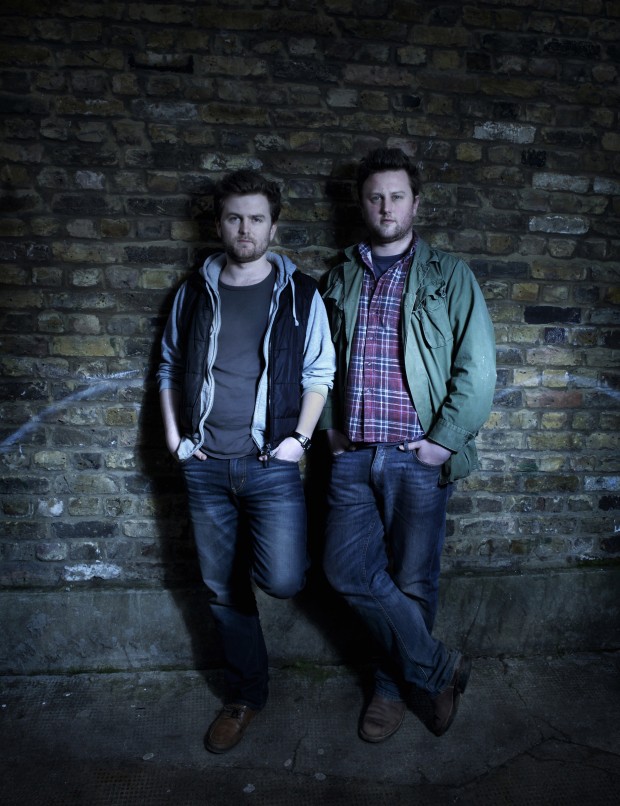 In “Jackboots on Whitehall,” directors Edward and Rory McHenry wanted to make a World War II inspired animated film that not only made you laugh, but was technical proficient in every way possible. Channeling Michael Bay, the brother-duo have more explosions in this film than the last Transformers film.
In “Jackboots on Whitehall,” directors Edward and Rory McHenry wanted to make a World War II inspired animated film that not only made you laugh, but was technical proficient in every way possible. Channeling Michael Bay, the brother-duo have more explosions in this film than the last Transformers film.
Mission accomplished.
But if you thought the film was all about action, you’d be wrong.
Not only did they get Ewan McGregor to voice the main character, Christopher, but also nabbed stars the likes of Dominic West, Tom Wilkinson, Timothy Spall and Alan Cumming to play roles.
The end result is solid English satire that is far from historically correct, but fun nonetheless.
In this Q & A, Edward and Rory McHenry discuss their new star-ladden World War II animated film and the process behind it.
Review Fix: What was the inspiration for the film?
Edward McHenry: Mainly from films we both love and grew up on. From the Indiana Jones series to more classic British cinema from the post war period – the Ealing Comedies like The Titfield Thunderbolt and Presberger and Powell Films like A Canterbury Tale. Those two in particular were a great influence on the feel of an old lost English countryside. Then every single war film ever made…
Review Fix: The type of animation used for the film is incredibly time consuming, considering that, how long did it take to complete the film?
Edward McHenry: It’s not stop frame animation as in a Wallace and Gromit, it was done with animatronics and rods. This meant that it was approached from a live action angle when we were scheduling it and especially shooting it. In all it took 10 weeks to film. The animation took place in the post-production period with animating the facial expressions.
Review Fix: When was the moment that you felt the film was coming together the way you would have liked?
Edward McHenry: While looking at the rushes during the filming. Our editor would give us a DVD every Friday during the shoot with the assembly of the current film on it. It was great to see the film grow week by week, but there was always a worry during week one of “is this idea of using puppets as people actually going to work – is it going to cut like a film with actors?” We soon found out that it did, but as we had prepped so hard and drawn every shot in storyboards – of cause it did!
Review Fix: How difficult was it to acquire the tremendous cast [Timothy Spall, Dominc West, Ewan McGregor and Alan Cumming] the film has? Any interesting stories as to how they were retained?
Edward McHenry: That was one of the easiest parts! I think because we approached them through voice-overs rather than a live action deal made it easier. It mean that they could come in and play historic characters for a few hours and then go home. We started out by going to a couple and one by one the momentum grew over a few weeks and by about week three we had everyone we wanted.
Review Fix: What is your favorite part of the film and why?
Edward McHenry: I think the scenes at the start of act 2 just after the Nazis have invaded are the best. When our hero’s are all grouped together in a barn in the countryside, the baddies are all in London and Churchill is stuck underground in his bunker with only Rupee and the Punjabi’s to defend him. I love those scenes as every character has been introduced and the story is now rolling with all our characters heading off on an adventure and all interlinked by the SOS radio message from Churchill.
Review Fix: Who is your favorite character and why?
Rory McHenry: Probably Fiske. During the filming it changed every day, mainly because some of the puppets were a lot easier to work with than others. Braveheart was a nightmare! He never seemed to do what you wanted him to do and kept catching fire. Daisy was very easy to work with; she was very professional.
Review Fix: If you could change one thing about the film, what would it be and why?
Rory McHenry: More explosions… There were a lot more sets and London monuments we could have blown up!
Review Fix: Many viewers who see the trailer for this film will instantly think of “Team America: World Police.” How would you explain its differences to them?
Rory McHenry: They are very different movies, although there’s obviously the puppet thing. What Matt Stone and Trey Parker did with Team America was a definite parody of those Gerry Anderson shows like Thunderbirds and Captain Scarlet, and they got it spot on with the strings and the funny walking and stuff. What we wanted to do was something more cinematic – not necessarily make jokes about the characters being puppets. But we love Team America, Matt Stone and Trey Parker are absolute geniuses.
Review Fix: How do you want this film to be remembered?
Rory McHenry: As the smallest big action movie ever conceived.


Leave a Reply